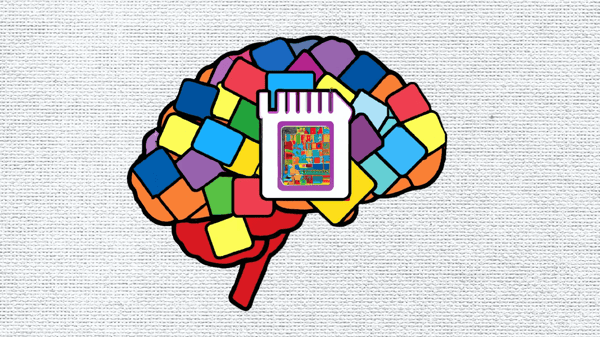Have you ever walked into a room and forgotten why you walked in there in the first place?
Do you occasionally set down your keys for a minute and then have no clue where you left them? (And then find them in the freezer later?)
Are there times when you finish telling a story and can't remember why you told that story in the first place?
(Are you feeling called-out yet?) You may have written off these moments as "drawing a blank", but what you were really experiencing were lapses in your working memory, which can be caused by various mental health conditions.
Too long; didn’t read
- Short-term memory refers to the temporary storage of information; working memory is the ability to use, manipulate, and apply knowledge in the immediate future.
- We all have different working memory capacities, and they can change throughout life.
- ADHD, autism, anxiety, depression, and even low sleep quality can affect working memory.
- Making checklists, monotasking, and other strategies can help improve your working memory.
How does working memory work?

The first thing you need to know about working memory is that it is not just another way of saying “short-term memory.” The phrase “short-term memory” refers to the temporary storage of information; working memory is the ability to use, manipulate, and apply information in the immediate future.
Working memory is essential for various mental processes, such as doing a math problem in your head or recalling instructions from your boss.
Two cognitive systems comprise our working memory: verbal and visuospatial.
Verbal and visuospatial working memory
Verbal working memory is the ability “to maintain and manipulate verbal information for a short period of time.”1 However, this is not to be confused with "auditory information", which would be something you can hear. Verbal working memory simply applies to anything that has words or descriptions tied to it.
Visuospatial working memory, on the other hand, “maintains a limited amount of visual information so that it can be quickly accessed to serve the needs of ongoing tasks.”
Verbal and visuospatial working memory frequently overlap. For instance, you might use verbal working memory when recalling the definition of a word you just learned and visuospatial working memory to identify the part of a dictionary page that featured the definition.
We don't all have the same amount of working memory; the amount you have access to is known as working memory capacity.2 Some of us have considerably lower working memory capacities as a baseline because of our biology or life circumstances.
Conditions and circumstances that can decrease working memory capacity:3
- Attention-deficit/hyperactivity disorder (ADHD)
- Autism spectrum disorder (ASD)
- Alzheimer's disease
- Anxiety or depression
- Age
- Intelligence
- Mood
- Low sleep quality
Also - working memory capacity isn’t static.
⚠️ Spoiler alert: even if you don’t have working memory issues right now, you probably will later in life. After all, everyone gets older. That said, there are a few strategies that certain groups of people, such as those with ADHD, can implement to minimize the fallout of less-than-ideal working memory.
Four strategies to improve your working memory
1. Make a running checklist.
You’ve probably heard this one before—but that’s because it’s effective! You can make one in three easy steps:
- First, jot down all the tasks you have to do.
- Next, figure out the order in which they’re due.
- Finally, itemize the steps you need to take to get each of them done.
Making such a checklist doesn’t just help you keep tabs on what you need to do; it positions you to get back on track if you forget what you’re doing or get distracted by something else. (Hey, you’re only human.)
Prioritize, prioritize, prioritize!
2. Minimize your multitasking habits
Research has identified working memory as “a critical component of multitasking ability.”4 So, it just makes sense that multitasking is like kryptonite for people with reduced working memory capacity.
If you’re one of those people, the fewer things you have to remember, the better you’ll be able to remember them. So don’t set yourself up for failure by doing more than one task simultaneously. Chances are, it will prevent you from completing any of them. So instead, try tackling each item on your to-do list individually.
3. Practice mindfulness.
Mindfulness, the ability to focus on the present moment and tune out distractions like random memories or worries, is crucial to mental health. "Mindfulness training” may have a discernible positive effect on one's working memory.
A 2018 study found that mindfulness boosts the density of the hippocampus, a brain region that plays a significant role in working memory.5 Types of mindfulness training include breathing techniques, visualization, yoga, and meditation.
4. Self-advocate.
We’re expected to absorb everything we’re told as soon as someone says it without needing to ask to repeat it. But, of course, keeping more than one piece of information in your mind at a time is virtually impossible if you have poor working memory.
So the next time a colleague is about to bombard you with information, say, “Could you hold on a sec while I finish something so I can give you my full attention?” and either finish what you’re doing or write a note to yourself, then listen to what they say.
In the long run, taking the time to set yourself up for success will benefit them, too.
-
Sources:
1 Frontiers in Human Neuroscience | Neural Correlates of Verbal Working Memory: An fMRI Meta-Analysis
2 Frontiers in Psychology | What is working memory capacity, and how can we measure it?
3 Journal of Attention Disorders | Is the Recall of Verbal–Spatial Information From Working Memory Affected by Symptoms of ADHD?
4 Journal of Applied Research in Memory and Cognition | On the relation of working memory and multitasking: Memory span and synthetic work performance
5 Brain Imaging and Behavior | Reduced interference in working memory following mindfulness training is associated with increases in hippocampal volume




.jpg)



